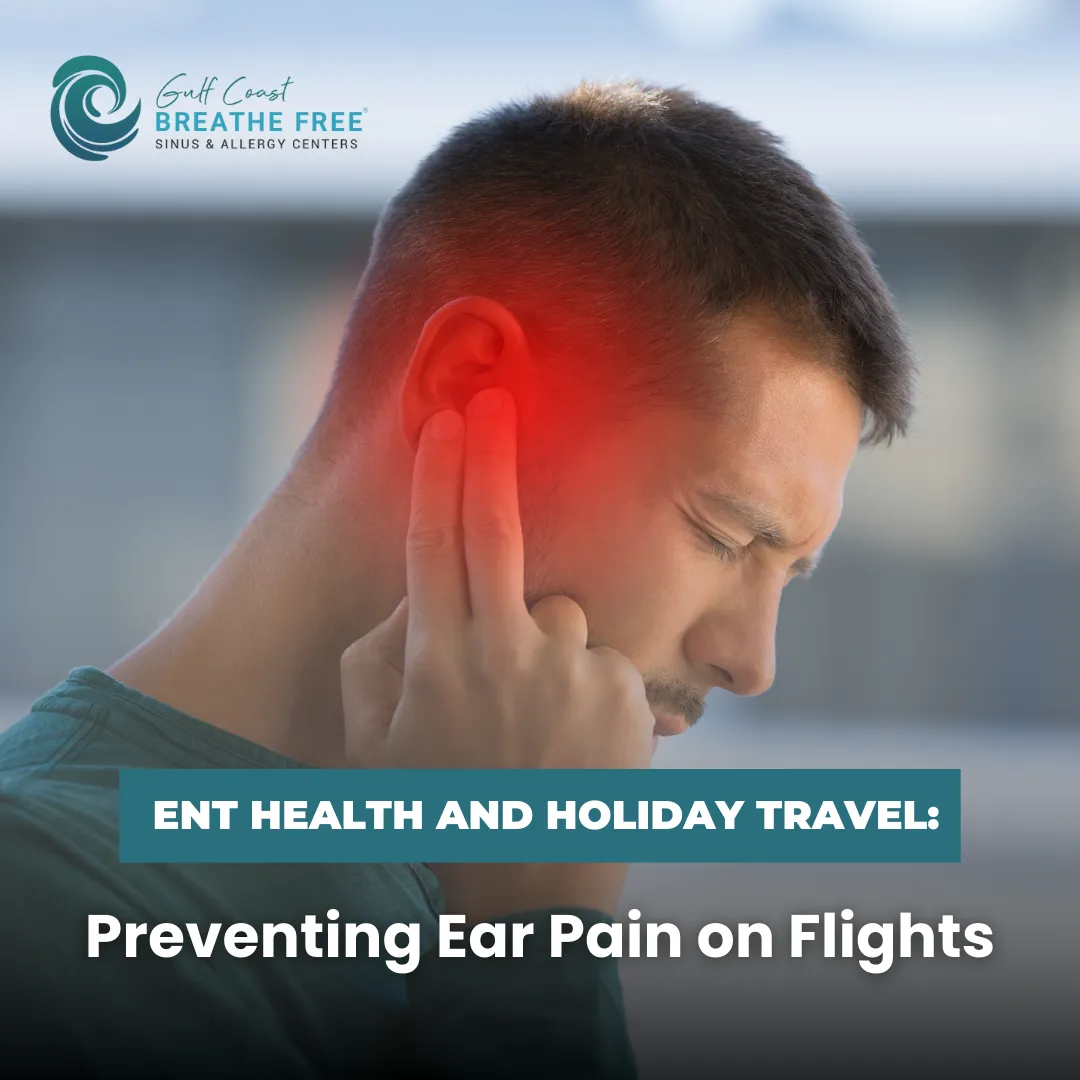ENT Health and Holiday Travel: Preventing Ear Pain on Flights
Frequent fliers know the popping sound and sensation on flights too well. This can be very uncomfortable and even painful. Most people dub these “airplane” ears and while they can often be uncomfortable and painful, it is not often due to an underlying condition. Instead, it’s typically due to the pressure changes during take-off and landing.
There are various ways adults and kids alike can alleviate this pain and discomfort when flying. As the holiday travel season approaches, such tips and measures are for sure at the top of many people’s travel essentials.

What Are “Airplane Ears”?
The official medical term for “airplane ears” is ear barotrauma. It is also sometimes called aerotitis media or parotitis media.
Ear barotrauma occurs when the air pressure in the middle ear and the air pressure in the environment. The pressure change is more prominent during take-off and descent and most often, airplane ears are more prominent for many people during these times as well.
The pain and discomfort may be more pronounced if someone already has a cold or sinus infection because the present congestion makes it difficult to equalize ear pressure.
There is a narrow passage in our ears connected to the middle ear called the eustachian tube – which regulates ear pressure. In adults, this tube is slanted, allowing easy ear airflow, allowing it to equalize pressure easily. But in children, these tubes are flat, making it harder for children to equalize pressure in the ears. In this sense, children are more prone to airplane ears during flights.
Common symptoms of airplane ears include:
- Increased air pressure
- Muffled hearing
- Slight to moderate temporary hearing loss
- Moderate discomfort
- Ringing in your ear
- Stuffed feeling in your ear
How to Prevent Airplane Ears on Flights
There are several ways one can prevent and manage airplane ears on flights:
- Swallow and yawn
Swallowing and yawning will help open up the eustachian tube to equalize the pressure in your ears. Chew gum, suck hard on candy, or sip water during take-off and landing. These tricks can be especially helpful for kids who are uncomfortable due to airplane ears.
You can also induce a yawn intentionally or at least open your mouth as if you were yawning to help equalize ear pressure.
- Don’t sleep during ascents and descents
If you’re prone to airplane ears during flights, it would be in your best interest to not sleep during ascents and descents. If you’re awake during these times, you can do the necessary self-care steps to alleviate the pain and pressure in your ears.
- Pinch your nose and blow gently
The Valsalva maneuver is an effective way to equalize pressure in the middle ear during pressure changes in flights. Here’s how you can do this:
- Pinch your nostrils closed with your fingers.
- Keep your mouth closed.
- Gently blow air into your nose, as if you’re blowing your nose.
This technique will help open the eustachian tube and equalize ear pressure. Repeat this several times during ascent and descent.
- Use earplugs
Earplugs are readily available at drugstores, airport shops, and hearing clinics and can help equalize ear pressure. With earplugs, you will still need to yawn or swallow to relieve pressure in your ears.
- Try decongestants, antihistamines, and nasal sprays
If you have a cold, taking decongestants from 30 minutes up to an hour before your flight might help. Nasal sprays may also be an option if you are currently suffering from nasal congestion, also about 30 minutes before your flight. If you have allergy symptoms, try taking antihistamines to get nasal swelling down and reduce congestion.
- Take allergy medication
If you have allergies, take your allergy medication about one hour before your flight. This will help manage your symptoms so there is less pain and discomfort in your ears during flight.
Travel Woes? Let Gulf Coast Breathe Free Help!
Ear pain and discomfort are, unfortunately, pretty common during flights. The good news is that there are several techniques you can try to achieve relief from the pain and discomfort.
If the pain persists, it would be best to consult with your doctor as this may be a sign of an underlying condition. Get in touch with Gulf Coast Breathe Free for more information on ENT holiday tips and schedule a consultation with one of our experts today!

